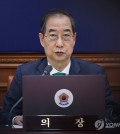- California Assembly OKs highest minimum wage in nation
- S. Korea unveils first graphic cigarette warnings
- US joins with South Korea, Japan in bid to deter North Korea
- LPGA golfer Chun In-gee finally back in action
- S. Korea won’t be top seed in final World Cup qualification round
- US men’s soccer misses 2nd straight Olympics
- US back on track in qualifying with 4-0 win over Guatemala
- High-intensity workout injuries spawn cottage industry
- CDC expands range of Zika mosquitoes into parts of Northeast
- Who knew? ‘The Walking Dead’ is helping families connect
China grows anxious about possible THAAD in Korea
BEIJING/SEOUL (Yonhap) — China seems to be shifting its focus to blocking the United States from expanding its military influence in Northeast Asia in dealing with North Korea’s recent nuclear test, observers said Thursday.
China is even threatening informally to retaliate with economic measures if South Korea allows the U.S. to deploy a THAAD advanced missile defense unit on its soil, they said.
China’s mistrust in South Korea has increased amid a stand-off over ways to handle North Korea’s provocation, according to a report by the Sejong Institute, a think tank in Seoul, based on interviews with more than a dozen Chinese experts.
Some of them were quoted as saying that South Korea’s economy will be hurt if THAAD is deployed in the nation.
China is South Korea’s major trading partner and also North Korea’s closest ally.
Beijing is apparently upset about the talk of a possibility that the U.S. will send a THAAD battery to Korea in a bid to counter the North’s missile and nuclear threats.
In her New Year press conference following the North’s Jan. 6 nuclear test, President Park Geun-hye said her government is looking at the issue from the perspective of national security.
Speaking to reporters in Beijing Wednesday. U.S. Secretary of State John Kerry said, “The United States will do what is necessary to protect our country and our friends and allies in the world.”
Chinese Foreign Minister Wang Yi warned the U.S. and other countries against any action to “provoke new tension in the situation, let alone destabilize the Korean Peninsula.”
Chinese media carried a series of reports critical of the possible deployment of THAAD on the peninsula. The THAAD, or Terminal High Altitude Area Defense, system includes the world’s most advanced mobile radar, which is capable of closely monitoring some parts of China.
“THAAD can have a very big impact on the security mechanism of China, the U.S. and Russia,” Zheng Jiyong, a professor at the Center for Korean Studies at China’s Fudan University, wrote in an SNS news outlet operated by the People’s Daily, an official newspaper of the Chinese Communist Party.
He said South Korea will have to consider the matter prudently.
The Global Times, an English-language Chinese newspaper, also said in an editorial that, “South Korea should avoid using the THAAD missile system as leverage against China.”
If Seoul were to do so, the mutual trust between Beijing and Seoul would be severely damaged, it added.















